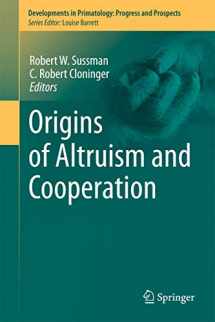
Origins of Altruism and Cooperation (Developments in Primatology: Progress and Prospects, 36)
Book details
Summary
Description
This book is about the evolution and nature of cooperation and altruism in social-living animals, focusing especially on non-human primates and on humans. Although cooperation and altruism are often thought of as ways to attenuate competition and aggression within groups, or are related to the action of “selfish genes”, there is increasing evidence that these behaviors are the result of biological mechanisms that have developed through natural selection in group-living species. This evidence leads to the conclusion that cooperative and altruistic behavior are not just by-products of competition but are rather the glue that underlies the ability for primates and humans to live in groups. The anthropological, primatological, paleontological, behavioral, neurobiological, and psychological evidence provided in this book gives a more optimistic view of human nature than the more popular, conventional view of humans being naturally and basically aggressive and warlike. Although competition and aggression are recognized as an important part of the non-human primate and human behavioral repertoire, the evidence from these fields indicates that cooperation and altruism may represent the more typical, “normal”, and healthy behavioral pattern. The book is intended both for the general reader and also for students at a variety of levels (graduate and undergraduate): it aims to provide a compact, accessible, and up-to-date account of the current scholarly advances and debates in this field of study, and it is designed to be used in teaching and in discussion groups. The book derived from a conference sponsored by N.S.F., the Wenner-Gren Foundation for Anthropological Research, the Washington University Committee for Ethics and Human Values, and the Anthropedia Foundation for the study of well-being.


We would LOVE it if you could help us and other readers by reviewing the book
Book review



